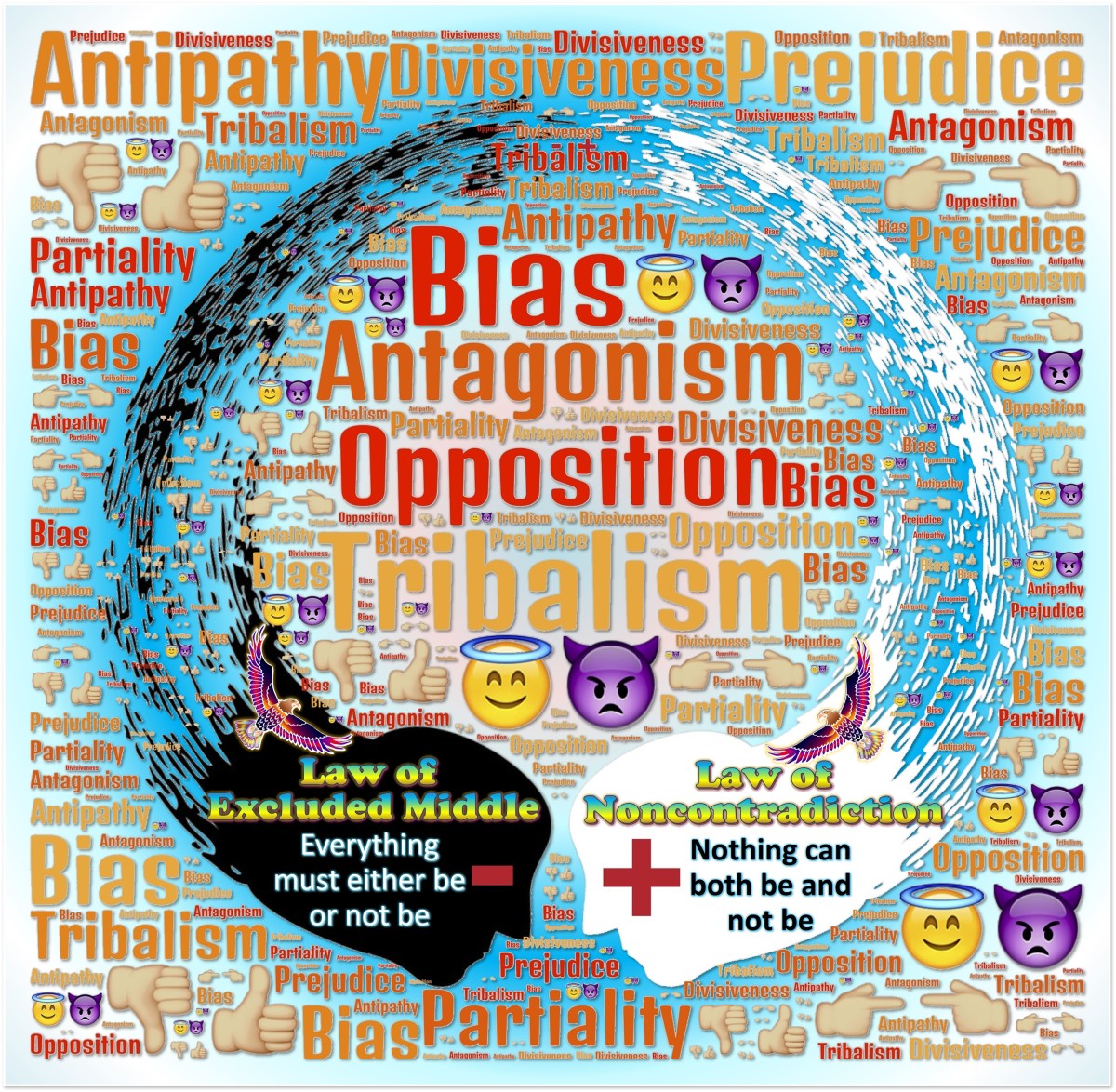Polarization bounded by the Law of Noncontradiction and the Law of Excluded Middle
The scope, reliability and validity of any quotation or statement can be checked against, and contrasted with, those of its opposing form or contradictory counterpart, if the latter can be found or formulated. It is somewhat ironic or paradoxical that to ascertain the soundness of a certain quotation or statement is to involve knowing, recognizing or even appreciating its contrary kind, opposite exemplar, reversed archetype or antithetical equivalent. Herein lies an implicit but palpable lesson that we ought to be mindful of being overly confident about our understanding of, and adherence to, certain quotations or statements, and that we stand to gain better or extra perceptivenesses, perspectives and insights by being receptive and empathetic towards those conflicting quotations or clashing statements that seem to be (purveying the) oppugnant or irreconcilable, as the latter can potentially shed light on the validity, consistency, reliability and generalizability of our claims, positions or convictions. One way to measure the morality or validity of a quotation or statement is to determine how and why it enshrines, benefits or preserves the right, freedom, tradition or idea of its proponents as well as how and why it affects, curtails or infringes those of its opponents. Even if some or all proponents and opponents may not aspire or commit to achieving empathy, compromise, concession, conciliation, cooperation, agreement, fairness, magnanimity, or objectivity in value judgements, when two claims or beliefs contradict each other, the law of noncontradiction and the law of excluded middle dictate that they cannot both be right, and hence everyone involved in those claims or beliefs ought to be seeking out the right answer or better path to resolve the disagreement. The corollary of both laws is that people can avoid or reduce conflict and misunderstanding by refraining from being too quick to dismiss or denigrate other viewpoints without giving them full consideration and attempting to reach empathy, acceptance, settlement or common ground.
Given that proponents and opponents holding their respective contradictory claims or conflicting beliefs cannot both be correct in the same sense at the same time (to the extent that ‘nothing can both be and not be’ and ‘everything must either be or not be’), it behoves us to understand the differences and bridge the gaps that exist amongst people such that we may indeed be better informed of the pros and cons of the matters in contention with respect to the claims, positions or convictions involved, as influenced and constrained by (the nature of) our emotional hangups, psychological makeups, mental barriers and cognitive filters. It is not so much a logical matter as it is a psychological one to ignore or contradict the law of noncontradiction and the law of excluded middle, insofar as what an American educator, businessman, motivational author and keynote speaker, Stephen Richards Covey, proposes as the essential ingredient of synergy (for the purpose of achieving interaction or cooperation such that the combined effect or resulting whole is greater than the sum of its separate effects or parts) on page 277 or 289 (depending on the edition) of his seminal self-help book entitled “The 7 Habits of Highly Effective People: Powerful Lessons in Personal Change” as follows:
Valuing the differences is the essence of synergy—the mental, the emotional, the psychological differences between people. And the key to valuing those differences is to realize that all people see the world, not as it is, but as they are.
If I think I see the world as it is, why would I want to value the differences? Why would I even want to bother with someone who’s “off track”? My paradigm is that I am objective; I see the world as it is. Everyone else is buried by the minutiae, but I see the larger picture.…
If that’s my paradigm, then I will never be effectively interdependent, or even effectively independent, for that matter. I will be limited by the paradigms of my own conditioning.
The person who is truly effective has the humility and reverence to recognize his own perceptual limitations and to appreciate the rich resources available through interaction with the hearts and minds of other human beings. That person values the differences because those differences add to his knowledge, to his understanding of reality. When we’re left to our own experiences, we constantly suffer from a shortage of data.
Is it logical that two people can disagree and that both can be right? It’s not logical: it’s psychological. And it’s very real.
